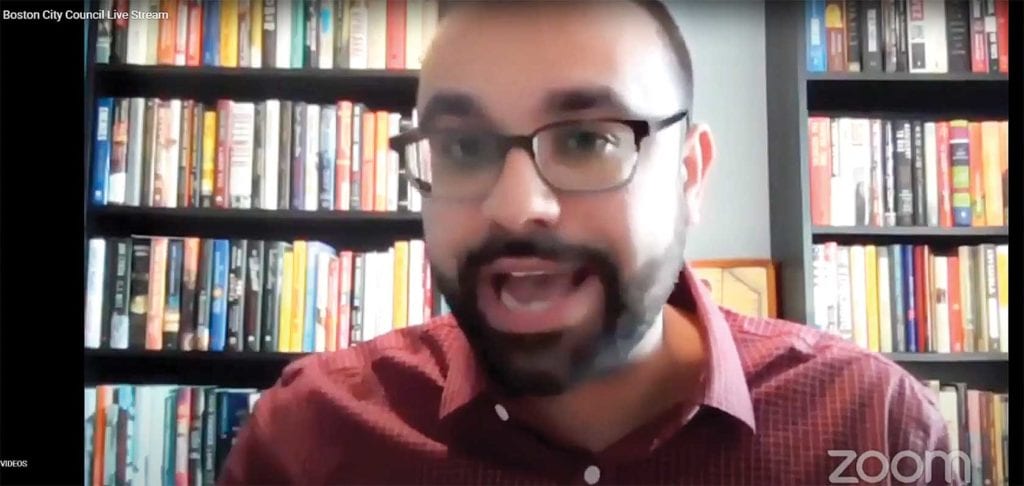Council mulls action on student debt
Activists push for borrowers’ bill of rights

City Councilors heard testimony Monday from recent college graduates and higher education activists about the impact of student loan debt on Bostonians — a crisis some characterized as a “second pandemic” that disproportionately affects Black and Latino borrowers.
“The American dream is at risk here,” said City Council President Kim Janey during opening remarks. “Student debt is an anchor, weighing families down.”
While the City Council does not have governance over student loans, activists are asking the body to conduct a study of student debt in the city and are asking state lawmakers to establish a “borrowers’ bill of rights” protecting residents against unlawful collection tactics.
Before hearing testimony from Boston residents and higher education officials, the councilors themselves shared their own experiences with student debt. District 5 Councilor Ricardo Arroyo described how he has acquired close to $300,000 in student loan debt after attending law school, then working as a public defender.
“We exist in a culture and society that makes it clear that education is the way forward,” Arroyo said. “Our children go to college and attempt to disrupt cycles of poverty … they are instead forced to make difficult decisions of whether they’ll ever be able to afford a home.”
Carlos Santiago, the commissioner of the Massachusetts Department of Higher Education, noted that the state has decreased its investment in its public colleges and universities in recent decades.
“We’re in the bottom third of states,” he said.
UMass Boston Chancellor Marcelo Suárez-Orozco said the $1.6 trillion in debt owed by students constitutes the second highest category of consumer debt in the U.S., and Roxbury Community College President Valerie Roberson said defaults on student loans are highest among low-income students who pursue associate degrees at community colleges. Of those who fail to complete their degree, 30% are in default. For borrowers who do obtain a degree, 25% are in default, compared with 11% of those who obtain a bachelor’s degree.
Vanessa Snow is not in default, but the union organizer said she is facing $78,000 in student debt acquired while obtaining her bachelor’s degree from UMass Amherst. After graduating during the Great Recession of 2008, she found herself underemployed for three years, living with her parents. She now pays $800 a month toward her student loans.
“It took years before I could afford to even live in an apartment with roommates,” she said.
Snow is a Boston Latin Academy graduate who was part of a generation of Black and Latino students who were encouraged to go to college, but she said she and many of her friends are struggling under an unmanageable debt burden.
“We should be the success stories of the city, but the truth is, we’re going to be out of Boston,” she said.
The struggles facing college graduates in Boston have some college counselors questioning the efficacy of their work. Peter Barros, executive director of the Lynn-based college prep program La Vida Scholars, said he won’t pay off his own student debt until he’s 40. He said he wonders whether the students he’s counseling will fare any better.
“I worry about what I’m helping them do,” he said. “How are they doing with their debt? Have I done them a disservice?”
Katherine Welbeck, counsel at the Student Borrower Protection Center in Washington D.C., told the councilors that researching the impact of student debt at the city level can help municipalities better protect student borrowers. A city of San Francisco study found that 300,000 Bay Area borrowers could benefit from existing programs. The city was then able to reach out to borrowers and offer assistance.
“Similar things could be done in Boston,” Welbeck said. “When we get the research, we’re able to use more granular approaches.”
Claudio Martinez, executive director of Zero Debt Massachusetts, is advocating for studies to be conducted in Boston and other Massachusetts cities. He said the San Francisco study provides a good model for what can happen in Massachusetts.
“The identification of student debt distress hotspots has sparked a conversation about how outreach and enrollment infrastructure for other social services — such as housing and food assistance — can be leveraged through targeted, local intervention to guide borrowers toward protections such as income-driven repayment,” he said.
The group is also backing legislation sponsored by Rep. Nika Elugardo that would create a student loan borrower’s bill of rights — a set of enhanced consumer protections for student borrowers — and establish a student loan ombudsperson position under the state attorney general.
State attorneys general in recent years have brought lawsuits against student loan debt servicers, alleging misconduct and improper administration of federal programs such as Public Service Loan Forgiveness, which was designed to forgive loans for borrowers working in public interest jobs.
“Massachusetts has 855,000 student borrowers with a combined $33 billion in student debt, and no basic protections against predatory student loan servicers and debt collectors,” Martinez said.







